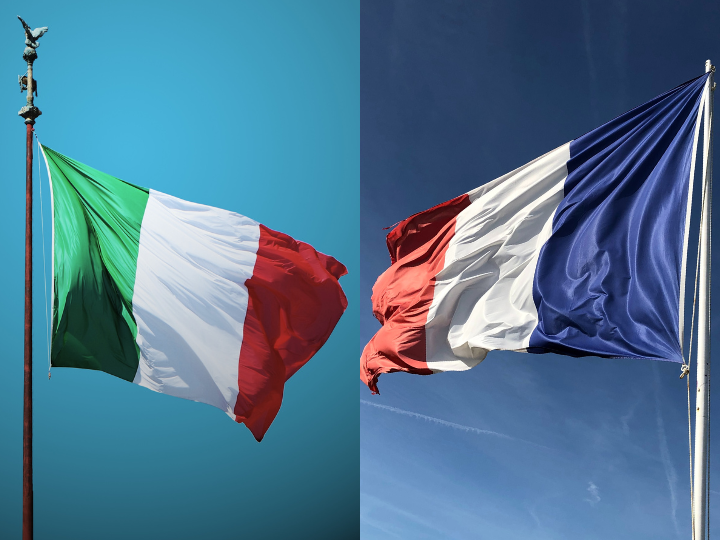by Federica Pascale
After a brief thawing, the frost has once again returned between Rome and Paris after French Interior Minister Gerald Darminin called Italian Prime Minister Giorgia Meloni “incapable” of controlling the migratory phenomenon, and Italy responded by cancelling Foreign Minister Antonio Tajani’s visit at the last minute.
Meloni (Fratelli d’Italia/Ecr) is “incapable of solving the migratory problems” of Italy, which is experiencing “a very serious migratory crisis”, Darmanin said during an interview with broadcaster RMC.
“Ms Meloni, who leads an extreme right-wing government chosen by Ms Le Pen’s friends, is incapable of solving the migration problems for which she was elected”, Darminin said.
The French minister had been asked to comment on some statements by Jordan Bardella, president of Marine Le Pen’s party – Rassemblement National (RN) – regarding the French-Italian border issues with migrants.
The RN is part, together with Matteo Salvini’s Lega, of the Identity and Democracy (ID) group in the European Parliament.
“Not really European solidarity: this is who does not want to solve the immigration emergency. If they think in Paris that Italy is the refugee camp of Europe, they are sadly mistaken”, reads an official note from Lega in the EU House.
Meloni is like Le Pen
During the interview, Darminin acknowledged that there is “a flow of migrants and especially minors” in the south of France but then shifted the entire responsibility onto Italy, which he says is incapable of managing the situation.
“The truth is that there is a political situation in Tunisia […] that causes many children, in particular, to pass through Italy and that Italy is unable […] to manage this migratory pressure”, the French minister explained.
He then compared Meloni and Le Pen: “Meloni is like Le Pen, she gets elected based on ‘you will see what you will see’, and then we see that [immigration] does not stop and grows”, Darminin said.
Mission to Paris cancelled on the fly
Rome reacted quickly by cancelling the long-planned official visit of Foreign Minister and Deputy Prime Minister Antonio Tajani (Forza Italia/PPE) to Paris to meet his French counterpart, Catherine Colonna.
“I will not go to Paris for the planned meeting with Colonna. The insults to the government and Italy uttered by Minister Darmanin are unacceptable. This is not the spirit in which common European challenges should be addressed”, Tajani wrote on Twitter.
However, Colonna tried to remedy Darminin’s words by inviting Tajani to Paris again.
“I spoke with my colleague Antonio Tajani on the phone. I told him that the relationship between Italy and France is based on mutual respect, between our two countries and between their leaders. I hope to welcome him soon in Paris”, Colonna wrote on Twitter.
An official note from the Quai d’Orsay states, “the French government hopes to work with Italy to meet the common challenge represented by the rapid growth in migratory flows”.
“The relationship between France and Italy” – the note continues – “is based on mutual respect, between our two countries and between their leaders. This is the spirit of the Quirinal Treaty”. The migration issue “must be tackled by all member states, bearing in mind that we can only succeed and be effective with concertation and calm dialogue”.
“The external dimension of migration, which implies, in particular, the close strengthening of cooperation with the countries of origin or transit of migrants, is one of the pillars of the European strategy and is the subject of exchanges between the French and Italian governments, in particular between the two foreign ministers”, the note concludes.
Meloni talks with Haftar
Meanwhile, Meloni met Libyan General Khalifa Haftar in Rome on Thursday, to discuss migration and the broader issue of stabilising Libya and North Africa.
Last January, the Italian premier was in Tripoli to meet the Prime Minister of the Libyan National Unity Government, Abdelhamid Dbeibah.
During her meeting with Haftar, Meloni reiterated that Italy confirms its support for UN action in Libya in revitalising the political process that could lead to presidential and parliamentary elections by the end of 2023.
Since taking office in government, Meloni has visited Libya, Algeria, and Ethiopia to conclude advantageous agreements on energy supplies and limit migratory flows to Italy.
*first published in: Euractiv.com




 By: N. Peter Kramer
By: N. Peter Kramer

